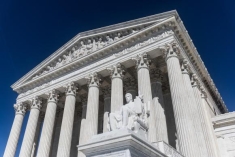Clinic Files Supreme Court Brief in Support of Immigration Journalists

June 22, 2023 Update: Even though the Supreme Court did not find the statute to be unconstitutionally overbroad, as the International Human Rights Clinic's brief argued, the majority opinion interpreted the statute in a way that did away with the constitutional deficiencies. Just as the Clinic argued, journalists cannot be arrested merely for reporting on immigration issues. The dissenting opinion, written by Supreme Court Justice Kentanji Brown Jackson, criticized the majority for not finding the statute unconstitutional on its face, as the Ninth Circuit Court of Appeals had done. In her dissenting opinion, Justice Jackson referenced the Clinic's brief, and the arguments made by the Clinic and other amici.
The Rutgers Law International Human Rights Clinic (IHRC) filed an amicus brief with the U.S. Supreme Court focusing on protecting journalists who report on immigration reform. The brief argues that journalists have the right, under the First Amendment, to report freely on immigration issues without fear of being arrested, harassed, or intimidated by the government. IHRC Director and Distinguished Clinical Professor of Law Penny Venetis filed the brief today, which included the work of four IHRC students.
Our team worked really hard on this brief, and I am proud to have advocated for the rights of journalists and the freedom of the press,” said third year student Anna Griffith. “It is work like this that made me want to go to law school.”
The United States of America v. Helaman Hansen case centers on whether the First Amendment permits criminal punishment of speech that merely encourages a noncitizen to remain in the United States, without any requirement of intent to further illegal conduct, when remaining in the United States is itself not a crime.
The brief states that the statute is “unconstitutionally overbroad and can easily be used to silence journalists in violation of the First Amendment’s guarantee of freedom of the press.” The government has already admitted to using the law to gather information, impede free movement, and harass and detain journalists reporting on the “migrant caravan” that traveled to the U.S.-Mexico border in 2018 and 2019.
Second year student Tehmina Pechefsky said, “Working on the Hansen amicus brief was an exciting venture into the intricacies of federal statutory reach. Professor Venetis’ approach to the subject matter of the brief was a fun and novel learning experience for us. She is a rigorous, engaging, and enthusiastic editor and educator.”
The Clinic's brief also discusses how First Amendment law is mirrored in cases decided by the European Court of Human Rights and the Inter-American Court of Human Rights. It shows how "overbroad" statutes that can be easily used to arrest journalists have been invalidated under both U.S. and international law.
IHRC is a pioneer in using international human rights law in courts throughout the United States. Students enrolled in the Clinic challenge and change unjust laws by representing individuals whose rights have been violated, and through the legislative process. Students learn two areas of substantive law: constitutional law and international human rights law; both are used in their advocacy. Clinic students are engaged in all levels of advocacy: from interviewing clients, drafting court pleadings, and engaging in the discovery process to writing briefs, oral advocacy, and trial work.
“This Clinic has been life-changing, truly. That is not an overstatement, because the work that we do truly is life-changing,” said third year student Amera Hamed. “We are impacting real people’s lives and there is nothing better than that.”
Second year student Dave Bialy said, “The International Human Rights Clinic has been an amazing opportunity; now, I know that a project I worked for is being read by Supreme Court Justices and could affect the outcome of their deliberations, something that I never even dreamed of before!”